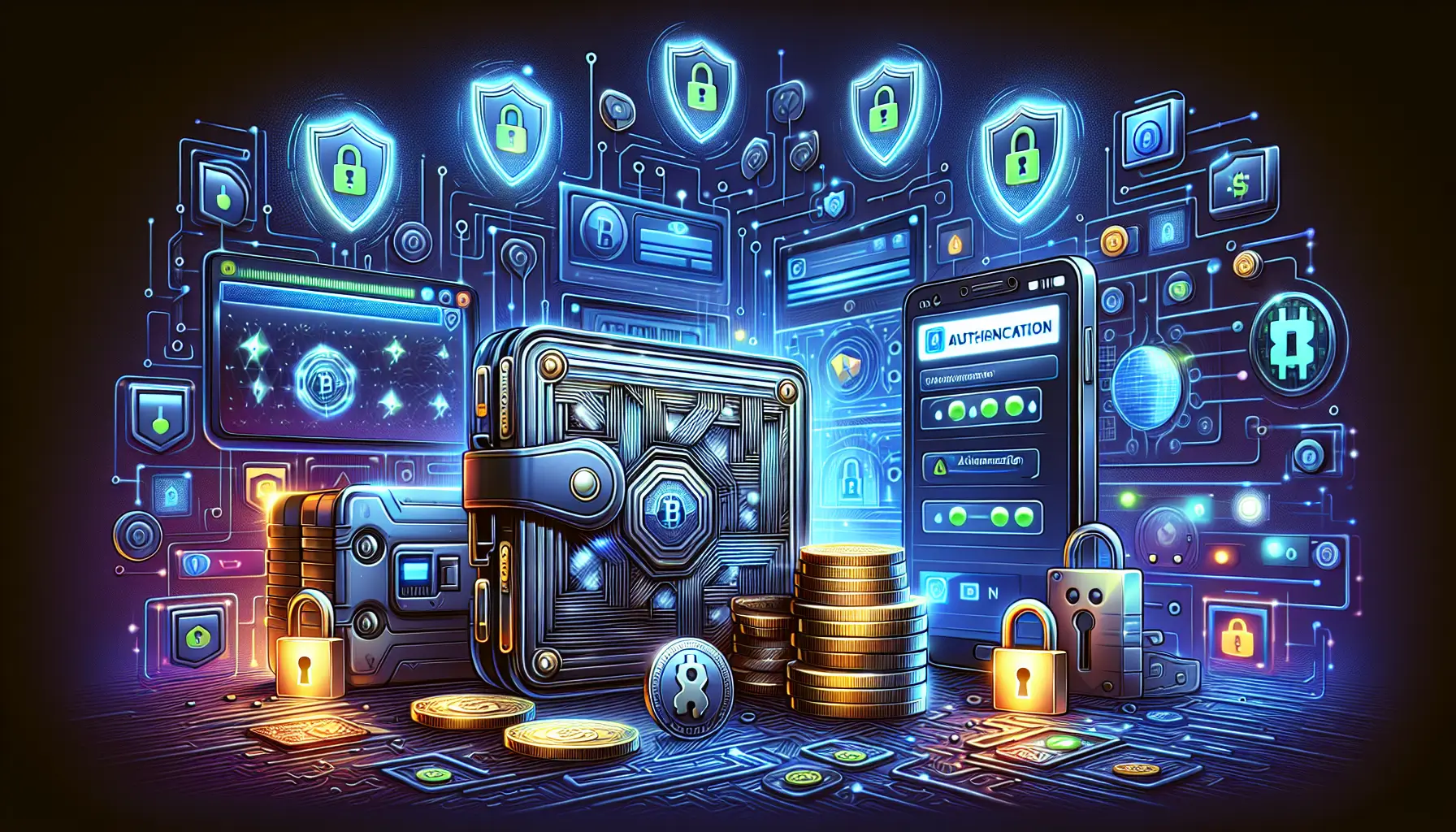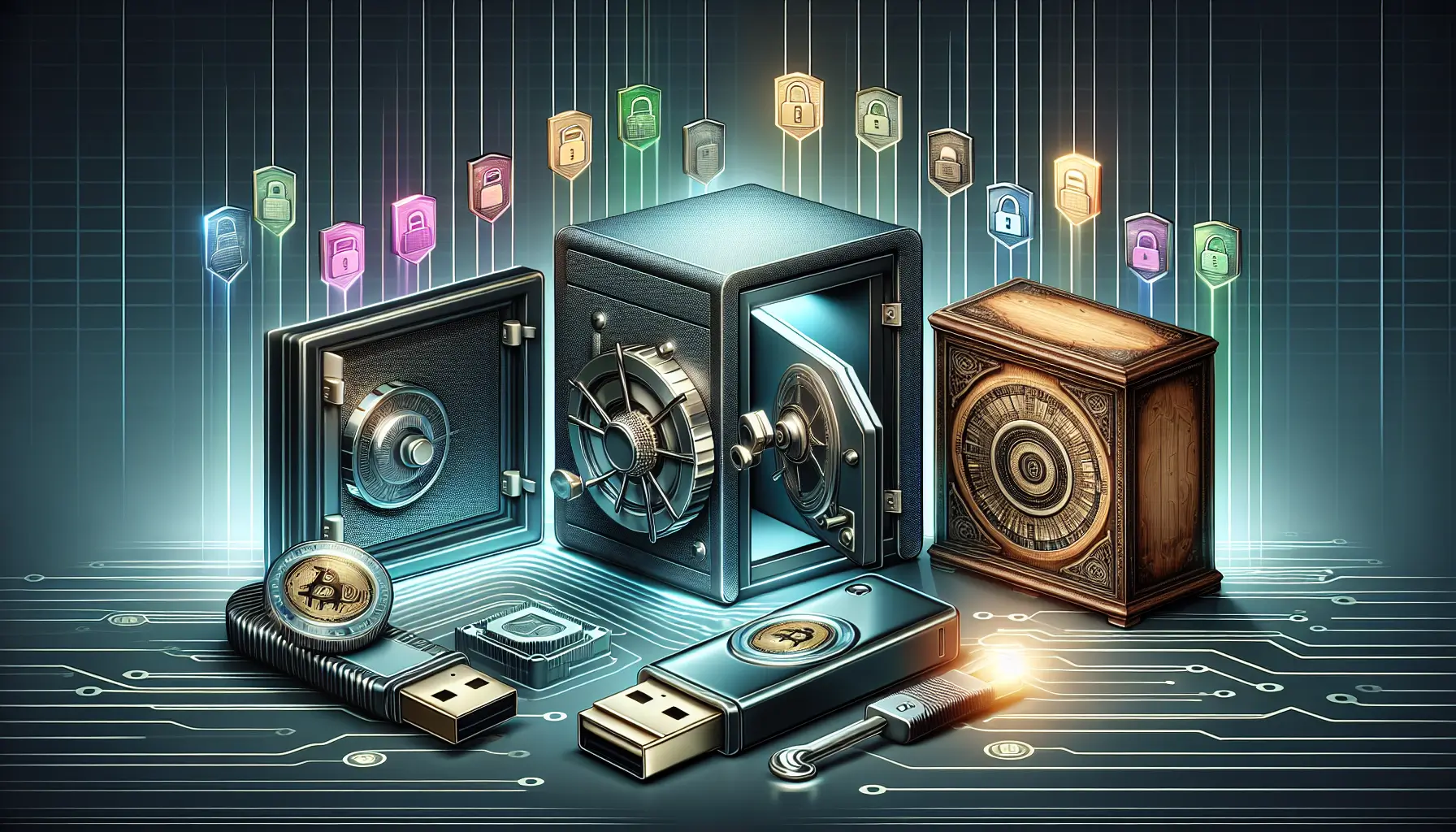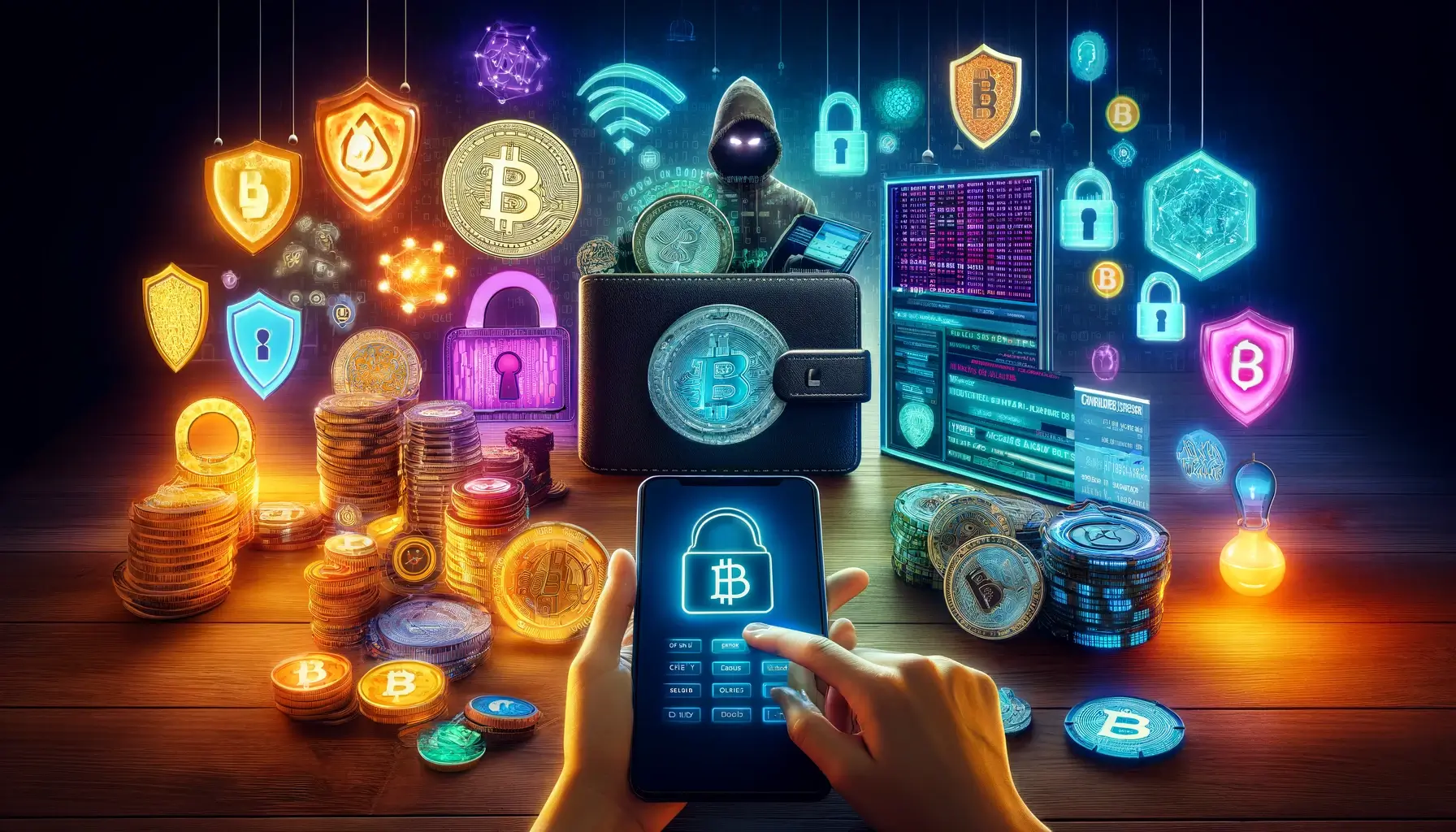Can cryptocurrency be hacked? Yes, it seems cryptocurrency can be stolen and hacked and stolen. Can your crypto wallet be hacked and stolen? Both hot and cold wallets have risks and vulnerabilities, and crypto wallets can be hacked. In this article, we’ll explore how these cryptocurrency hacks happen and what steps you can take to protect your digital assets from cryptocurrency hacks. Implementing robust cybersecurity measures is essential to protect your digital assets from these threats.
Main Points
- Crypto wallets are classified into hot wallets, which are internet-connected and convenient but more vulnerable to hacking, and cold wallets offline and offer enhanced security for long-term storage.
- Common hacking methods for crypto wallets include phishing attacks, malware infections, and Man-in-the-Middle attacks, highlighting the importance of security awareness among users.
- Implementing strong security practices and protocols, such as using hardware wallets, enabling two-factor authentication, and regularly updating software, is crucial for safeguarding digital assets against potential hacks.
- The prevalence of exchange hacks is a growing concern as cryptocurrencies gain popularity. Understanding the vulnerabilities of hot wallets and the methods hackers use to exploit exchange systems is essential for implementing better security measures for cryptocurrency owners and traders.
Understanding Crypto Wallets

Crypto wallets are fundamental tools in digital currencies, acting as the interface between users and the digital ledger called a blockchain. These wallets are applications that store, manage, and transact with cryptocurrencies. They do not hold the cryptocurrencies but store the digital keys required to access and manage those assets. Recognizing the various types of crypto wallets is vital for investors or users of digital currencies.
Crypto wallets come in various forms, including hot and cold wallets with distinct features and security levels. Hot wallets are connected to the internet, providing convenience for frequent transactions but at the cost of increased vulnerability. On the other hand, cold wallets store your keys and digital assets offline, offering enhanced security against unauthorized access. It is crucial to store your keys securely to maintain control over your cryptocurrency and avoid potential security breaches.
The specifics of hot and cold wallets are explored in the next subsections.
Hot Wallets
Hot wallets are software applications requiring an internet connection to access cryptocurrency networks, making them highly convenient for regular transactions. They allow users to quickly send and receive digital currency, making them a popular choice for day-to-day use, but this convenience comes with significant security vulnerabilities. Since private keys are stored online, hot wallets are more susceptible to hacking attempts and unauthorized access.
The online nature of hot wallets exposes them to various vulnerabilities, such as phishing attacks and malware infections. These wallets are considered the least secure form of crypto storage due to their continuous connection to the internet.
Despite their risks, hot wallets remain popular because they facilitate instant financial transactions and provide easy access to funds. Therefore, using them cautiously and implementing additional security measures is essential.
Cold Wallets
In contrast to hot wallets, cold wallets use offline storage, significantly enhancing their security. These wallets include hardware and paper wallets, which store private keys offline. Storing private keys offline makes cold wallets far less vulnerable to hacking and unauthorized access. This makes them an excellent choice for long-term storage of digital assets.
Cold wallets are particularly suited for those who prioritize security over convenience. They provide a higher level of protection against vulnerabilities that plague online wallets. For instance, using cold wallets can drastically reduce the risk of cryptocurrency hacks, as the private keys for cryptocurrency transactions are recorded and not exposed to potential online threats.
This makes cold wallets an indispensable tool for securely storing significant amounts because cryptocurrency is a decentralized digital currency that uses cryptography as an asset.
How Crypto Wallets Can Be Hacked

The possibility of hacking crypto wallets raises significant concerns about the security of cryptocurrency storage due to various cyber-attacks. This threat is not just theoretical; it is a stark reality many crypto enthusiasts face. Hackers employ multiple methods to gain access to cryptocurrency wallets and exchange accounts, leading to significant financial losses. Common hacking techniques include phishing attacks, malware infections, and Man-in-the-Middle (MITM) attacks. Recognizing these methods helps implement effective security measures.
Phishing attacks trick users into revealing their private keys or credentials, while malware infections can compromise devices to extract sensitive information. MiTM attacks intercept communication between users and their cryptocurrency wallet exchange accounts, potentially leading to unauthorized access to cryptocurrency wallet exchange accounts. The following subsections will provide a detailed look into these hacking methods and their implications.
Phishing Attacks
Phishing attacks are one of the most common methods used to steal cryptocurrency. These attacks involve deceptive tactics to trick users into revealing sensitive information, such as private keys or wallet credentials. Hackers can access cryptocurrency owners’ accounts by sending fraudulent emails or setting up fraudulent websites that mimic legitimate crypto services.
Once users fall for these phishing schemes, their private keys can be stolen, leading to unauthorized access to cryptocurrency owners and significant financial losses. Phishing attacks exploit weaknesses in cryptocurrency networks and create opportunities for thieves to access users’ digital assets.
Staying vigilant and verifying the authenticity of communications requesting sensitive information is crucial.
Malware Infections
Malware infections pose a significant threat to crypto wallets, as they can infiltrate devices and extract sensitive information. This malicious code can steal crypto wallet passwords, seed phrases, and other critical data stored on the device. Once the information is compromised, hackers can access the victim’s cryptocurrency assets.
Malware infections often spread through malicious downloads, email attachments, or compromised software. These attacks highlight the importance of maintaining robust security practices, such as using reputable antivirus software and avoiding suspicious links.
Knowing the risks associated with malware enables users to take proactive steps to protect their crypto wallets.
Man-in-the-Middle (MiTM) Attacks
Man-in-the-middle (MITM) attacks are sophisticated cyber attacks where unauthorized parties intercept communication between two parties. In crypto wallets, MiTM attacks can compromise the security of transactions and lead to the theft of private keys. These attacks are done in certain scenarios, such as when users connect to public Wi-Fi networks.
The implications of MiTM attacks are severe, as they can result in unauthorized access to cryptocurrency assets and significant financial losses. Mitigating MiTM attacks involves using secure communication channels and clearing untrusted networks. Securing communications helps users protect the integrity of their decentralized digital currency assets and avoid unauthorized interception.
Notable Crypto Wallet Hacks

Understanding past cryptocurrency and exchange hacks can provide valuable insights into the vulnerabilities and risks associated with crypto wallets. Notable exchange and cryptocurrency hacks, such as the DAO and the Ronin Network hacks, highlight the potential consequences of security breaches. These incidents underscore the importance of robust security measures and awareness within the crypto community. Additionally, while known for its security features like transaction confirmations and immutability, the Bitcoin blockchain is not immune to vulnerabilities such as the 51% attack mechanism.
The DAO hack and the Ronin Network hack serve as stark reminders of the potential losses due to vulnerabilities in crypto networks. These events led to significant financial losses and heightened awareness about the need for better security practices, making it nearly impossible to overlook the importance of robust security measures.
The next subsections explore these notable hacks and their implications.
The DAO Hack
The DAO hack in 2016 is one of the most infamous incidents in the cryptocurrency world. This crypto hack led to the loss of $60 million due to vulnerabilities in the DAO’s smart contracts. Hackers exploited these weaknesses to siphon off funds, raising questions about the security of decentralized digital currencies.
The DAO hack profoundly impacted the cryptocurrency community, highlighting the might behind blockchain technology, the importance of smart contract security, and the potential risks associated with the concepts behind blockchain technology. This incident serves as a cautionary tale for developers and users alike, emphasizing the might behind blockchain technology and the need for thorough security audits and robust coding practices.
Ronin Network Hack
The Ronin Network hack in March 2022 resulted in the theft of approximately $625 million in Ethereum and USD Coin. This hack is believed to have been carried out by a North Korean hacking group, showcasing the global scale of cyber threats in the crypto landscape.
Attackers compromised four validator nodes on the Ronin bridge, allowing them to authorize significant withdrawals. The Ronin Network hack underscores the importance of securing validator nodes and implementing stringent security measures to protect against large-scale breaches.
This incident is a stark reminder of the vulnerabilities that hackers can use within blockchain technology and the cryptocurrency networks that hackers own.
Preventing Crypto Wallet Hacks

Strong security practices and robust tools are necessary to prevent crypto wallet hacks. Implementing measures such as using hardware wallets, enabling two-factor authentication (2FA), and keeping software updated can significantly reduce the risk of unauthorized access to software and crypto wallets being hacked. Such practices are crucial for safeguarding digital assets in the constantly evolving crypto landscape.
Using hardware wallets keeps private keys offline, drastically reducing exposure to online threats and cryptocurrency hacks. Enabling 2FA adds an extra layer of security, making it harder for hackers to access accounts. Regular software updates ensure that known vulnerabilities are patched, further enhancing security.
The following subsections will provide detailed insights into these preventive measures.
Use Hardware Wallets
Hardware wallets are a crucial tool for securely storing digital assets. These wallets operate offline, making it nearly impossible for hackers to hack or access them without physical possession. Storing private keys offline, hardware wallets significantly reduce exposure to online threats, offering greater security for long-term storage.
Using hardware wallets enhances security features and is recommended for those with significant amounts of digital currency that use cryptography as assets. These wallets securely store private keys, ensuring that digital currency that uses cryptography to secure transactions remains protected against unauthorized access.
Hardware wallets are indispensable for anyone serious about software wallets and crypto security.
Enable Two-Factor Authentication (2FA)
Enabling Two-Factor Authentication (2FA) is a simple yet effective measure to enhance account security. 2FA adds an extra verification step, requiring users to provide a second form of identification in addition to their password. This additional layer of security makes it significantly harder for hackers to gain unauthorized access, even if they obtain the user’s password.
Activating 2FA can involve SMS codes, authenticator apps, or hardware tokens. This extra verification step helps safeguard against unauthorized access and enhances the overall security framework of crypto wallets.
For anyone looking to secure their digital assets, enabling 2FA is a crucial step.
Regular Software Updates
Updating crypto wallet software is crucial for mitigating risks from known vulnerabilities. Software updates often include patches for newly discovered security vulnerabilities, ensuring that crypto wallets remain protected against potential threats. Regular updates are essential for maintaining the integrity and security of digital assets.
By keeping the crypto wallet and software current, users can protect against newly discovered vulnerabilities that hackers might otherwise exploit in your cryptocurrency, such as your cryptocurrency. This practice is fundamental to your crypto wallet security, as outdated software can expose wallets to significant risks.
Regularly updating crypto wallet software is a key preventive measure.
Storing Private Keys Safely

Storing private keys safely is paramount for securing digital assets. Cryptocurrency wallets are applications that store the digital. Owners of cryptocurrency wallets exchange the keys used to conduct transactions, and these private keys are stored. They must be kept secure to prevent unauthorized access. Utilizing cold wallets and encrypted USB drives are effective methods for safeguarding private keys.
Cold wallets provide enhanced protection by keeping private keys offline, reducing the risk of hacking attempts. Encrypted USB drives add an extra layer of security by protecting private keys with hardware encryption.
The next subsections provide more detail on these storage methods.
Avoid Storing Keys Online
Storing private keys online can expose them to significant risks. While convenient, cloud services and online platforms are vulnerable to hacking attempts, and unauthorized hackers can gain access to them. Hackers tend to gravitate toward these online storage methods because they provide a centralized point of attack, making it easier to steal sensitive information. Thieves tend to gravitate toward opportunities with the promise of easy riches and easy riches, particularly in cryptocurrency, highlighting the vulnerabilities within these networks.
Avoid storing private keys online to mitigate these risks. Instead, private keys should be stored in offline data storage units, such as cold wallets or encrypted USB drives. This practice significantly reduces the vulnerability of digital assets to cyber threats and keeps private keys secure.
Use Encrypted USB Drives
Encrypted USB drives offer a secure method for storing private keys, providing additional protection against unauthorized access. These drives use hardware encryption to safeguard their sensitive information, making it difficult for hackers to access even if the physical drive is compromised.
Encrypted USB drives offer a practical and effective way to store private keys securely. Keeping private keys offline and encrypted greatly reduces the risk of unauthorized access, ensuring the safety of digital assets.
This method uses cryptography to secure transactions and ownership information. It is particularly useful for those requiring a portable and secure storage solution for their private keys.
Choosing Secure Crypto Exchanges
Selecting a secure crypto exchange is critical in protecting your digital assets. The decentralized exchange nature of cryptocurrency makes it essential to choose centralized exchanges that prioritize security and have a strong reputation. Vulnerabilities in exchanges can be exploited by hackers, leading to significant financial losses. Additionally, a transparent transaction history is crucial for ensuring transparency and security, as it allows all transactions to be publicly viewable and helps prevent invalid transactions.
When evaluating crypto exchanges, consider their security measures, reputation, and insurance policies. Some exchanges offer insurance and compensation in the event of a hack, providing users with an added layer of protection.
The next subsections discuss these considerations in more detail.
Reputation and Security Measures
The reputation of a crypto exchange is a key indicator of its reliability and security. Examining user reviews and the exchange’s history can provide valuable insights into its trustworthiness. Additionally, reputable exchanges often implement robust security measures, such as multi-signature wallets and cold storage, for most of their funds.
Some exchanges also provide insurance for funds held in hot wallets, mitigating the risk of loss during breaches. Evaluate these security measures and the exchange’s track record before entrusting them with digital assets. A well-established exchange with a strong reputation and comprehensive security protocols ensures safe cryptocurrency transactions.
Insurance and Compensation
Insurance and compensation policies are important when choosing a crypto exchange. Some exchanges offer insurance coverage if cryptocurrency is stolen due to hacks or security breaches. However, not all cryptocurrency exchanges generally offer or guarantee compensation for losses incurred during hacking incidents.
Understanding the extent of the insurance coverage provided by an exchange is important. While some policies may not guarantee the full recovery of stolen funds, they can still offer investors significant protection and peace of mind.
Choosing an exchange with robust insurance and compensation policies can provide an added layer of security for your digital assets.
Summary
Securing your crypto assets requires a comprehensive approach that includes understanding the different crypto wallet types, being aware of common hacking methods, and implementing robust security measures. These strategies are essential for protecting your digital assets, from using hardware wallets and enabling 2FA to keep software wallets updated and storing private keys offline.
In conclusion, cryptocurrency offers exciting opportunities but also comes with significant risks. By staying informed and adopting best security practices, you can confidently navigate this landscape and protect your investments from potential threats. Remember, vigilance and proactive security measures are key to successful cryptocurrency management.
Frequently Asked Questions
What is the difference between hot and cold wallets?
The key difference in deep cold storage is that hot wallets are internet-connected for frequent, secure transactions and ownership. In contrast, called deep cold storage, wallets are generally offline data storage, offering superior security for long-term cold storage only.
How can I protect my crypto wallet from phishing attacks?
To protect and store your private keys and crypto wallet from phishing attacks, be vigilant about suspicious emails and websites, and never share your private keys, crypto wallet, or credentials with anyone. Always verify the authenticity of any communications requesting sensitive information.
Why are hardware wallets considered secure?
Hardware wallets are considered secure because they store private keys offline, significantly reducing the risk of exposure to online threats and hacking attempts. This offline storage store of your private keys ensures greater protection for your cryptocurrency assets.
What should I consider when choosing a crypto exchange?
When choosing a crypto exchange, assessing its reputation, security features, and insurance policies is crucial. Prioritize exchanges with a strong track record and proven security measures to ensure your assets are safe.
Is it safe to store private keys online?
It is unsafe to store private keys online due to the high risk of hacking and unauthorized access. The best practice is to use offline storage methods for private keys, like cold wallets or encrypted USB drives, for enhanced security.







